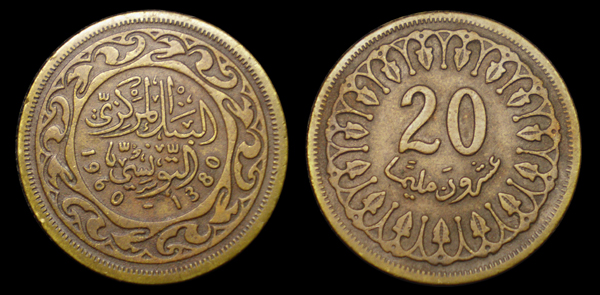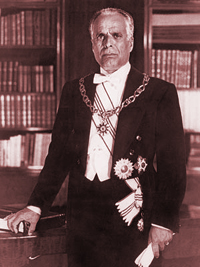
20 MILLIM COIN - TUNISIA
(KM 307)
Date: A.D. 1960
Obverse: Lettering with decoration - CENTRAL BANK OF TUNISIA 1380 - 1960
Reverse: Lettering with decoration - 20 MILLIMES
|
This is a coin from Tunisia, a country located in North Africa. It is the northernmost country on the African continent nestled between Algeria and Libya on the Mediterranean coast. Around forty percent of the country is composed of the Sahara desert with much of the remainder consisting of particularly fertile soil and a 1300 km coastline. Originally inhabited by Berber Tribes in ancient times, it was later settled by Phoenicians. It was the home of Carthage, the principle city of the Carthaginian Empire. After the destruction of Carthage by Rome in the Third Punic Wars, it became a part of the Roman African Province. Because of its fertile farm lands, it was known as on of the bread baskets of the Roman Empire. In the 7th century the region was conquered by Arab Muslims. In the 12th century, much of the coastal areas were then briefly conquered and held by Norman crusaders. Arabs reclaimed the area until Tunisia was conquered by the Almohad caliphs in 1159. They were succeeded by the long and generally prosperous rule of the Berber Hafsids from 1230 to 1574. In the late 16th century, the coast became part of the pirate territories collectively referred to as the Barbary States. Spain then seized many of the coastal cities, but these were eventually taken by the Ottoman Empire. Under its Ottoman Turk governors, the Beys, Tunisia attained virtual independence. The Hussein dynasty of Beys was established in 1705 which lasted until 1957. In the mid-1800s France had imperial aspirations and turned their eyes on Tunisia. The Tunisian government had begun to falter and the Bey borrowed large sums of money in an attempt to westernize the country. In 1878, a deal was made between the United Kingdom and France where the French accepted British control of Cyprus. The British, In turn, would accept French control of Tunisia. France assumed control of Tunisia and it was formally made a French protectorate on May 12, 1881. Later Tunisia would be the backdrop of the first major operations by the Allied Forces fighting in North Africa against Germany during WWII. Like most colonies there was resistance by natives to French control and a desire for self-governance. In 1920 a group called the “Destour” (constitution) party was created with the goal of seeking independence. They were not successful but this party laid the ground work for a new, more determined and outspoken, party calling itself the 'Neo-Destour' which formed In 1934. This new party was quickly banned by the French. Habib Bourguiba and other leaders in the Neo-Destour movement were imprisoned but continued to stir fervor among the people from their cells and the movement for independence continued. In 1954 new leadership in the French government caused a change in priorities and it began pulling out from colonies which had became troublesome, One of these colonies was Tunisia. In April of 1955, France gave Tunisia domestic autonomy under French suzerainty. Tunisia gained full independence in March 20, 1956 and Habib Bourguiba became the first president of the new Republic the next year. Bourguiba established a closed one-party state and would at the head of government for 31 years. He took measures to fight Islamic fundamentalism and supported women's rights. He introduced what was called the Code of Personal Status which outlawed polygamy, gave rights to women, introduced public education, modernization, a healthcare system, and improved literacy among many other initiatives that are considered rather progressive for a Muslim nation. In 1987 Bourguiba was judged unfit to perform the duties of president by medical experts. He stepped down and then prime minister Zine El Abidine Ben Ali became the second president of Tunisia, he has been in office ever since. Tunisia is now a republic with a president, a prime minister and a bicameral parliamentary system, including the Chamber of Representatives and the Chamber of Advisors. Since he came to power, commonly referred to as 'the Change', president Zine El Abidine Ben Ali has launched a series of reforms meant to introduce political pluralism and boost the economy. Tunisia has traditionally enjoyed a significant degree of religious freedom, a right protected in its modern constitution. The majority of Tunisia's population is Islamic, with a small minority of Christians and Jews. |

